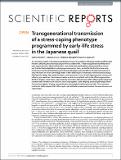Transgenerational transmission of a stress-coping phenotype programmed by early-life stress in the Japanese quail
Abstract
An interesting aspect of developmental programming is the existence of transgenerational effects that influence offspring characteristics and performance later in life. These transgenerational effects have been hypothesized to allow individuals to cope better with predictable environmental fluctuations and thus facilitate adaptation to changing environments. Here, we test for the first time how early-life stress drives developmental programming and transgenerational effects of maternal exposure to early-life stress on several phenotypic traits in their offspring in a functionally relevant context using a fully factorial design. We manipulated pre- and/or post-natal stress in both Japanese quail mothers and offspring and examined the consequences for several stress-related traits in the offspring generation. We show that pre-natal stress experienced by the mother did not simply affect offspring phenotype but resulted in the inheritance of the same stress-coping traits in the offspring across all phenotypic levels that we investigated, shaping neuroendocrine, physiological and behavioural traits. This may serve mothers to better prepare their offspring to cope with later environments where the same stressors are experienced.
Citation
Zimmer , C , Larriva Hormigos , M , Boogert , N J & Spencer , K A 2017 , ' Transgenerational transmission of a stress-coping phenotype programmed by early-life stress in the Japanese quail ' , Scientific Reports , vol. 7 , 46125 . https://doi.org/10.1038/srep46125
Publication
Scientific Reports
Status
Peer reviewed
ISSN
2045-2322Type
Journal article
Description
This study was funded by a BBSRC David Phillips Research Fellowship to K.A. Spencer (BB/L002264/1).Collections
Items in the St Andrews Research Repository are protected by copyright, with all rights reserved, unless otherwise indicated.

